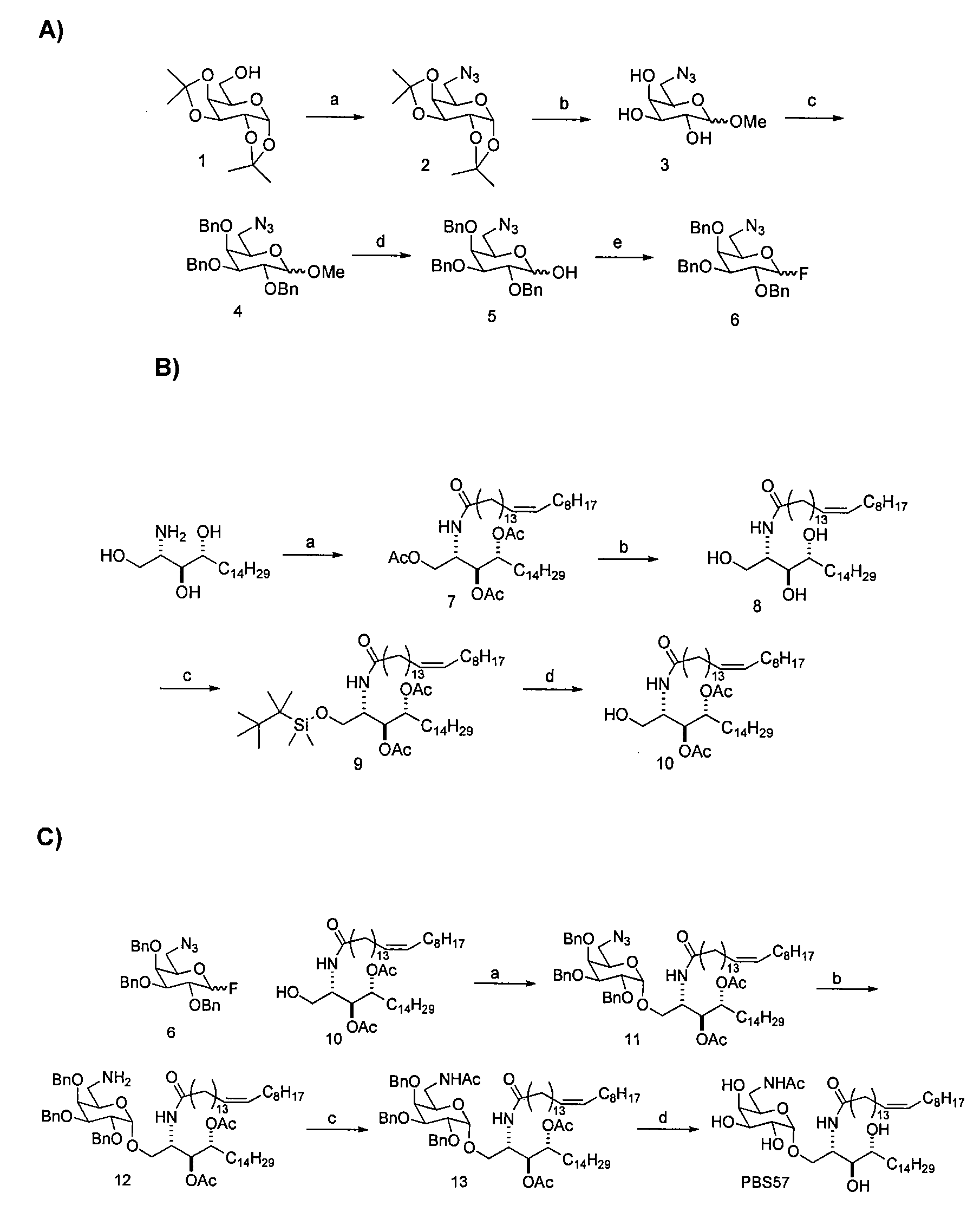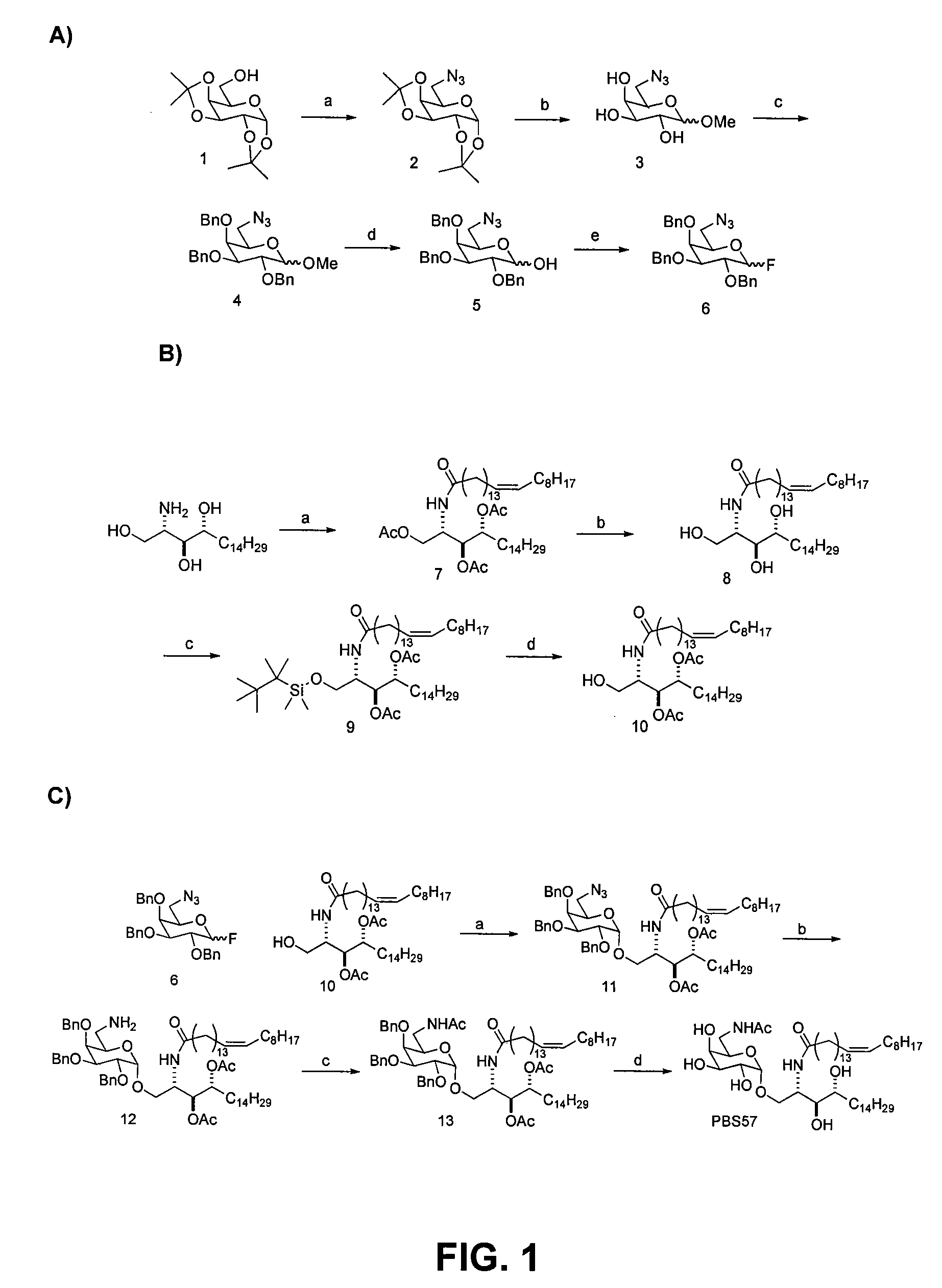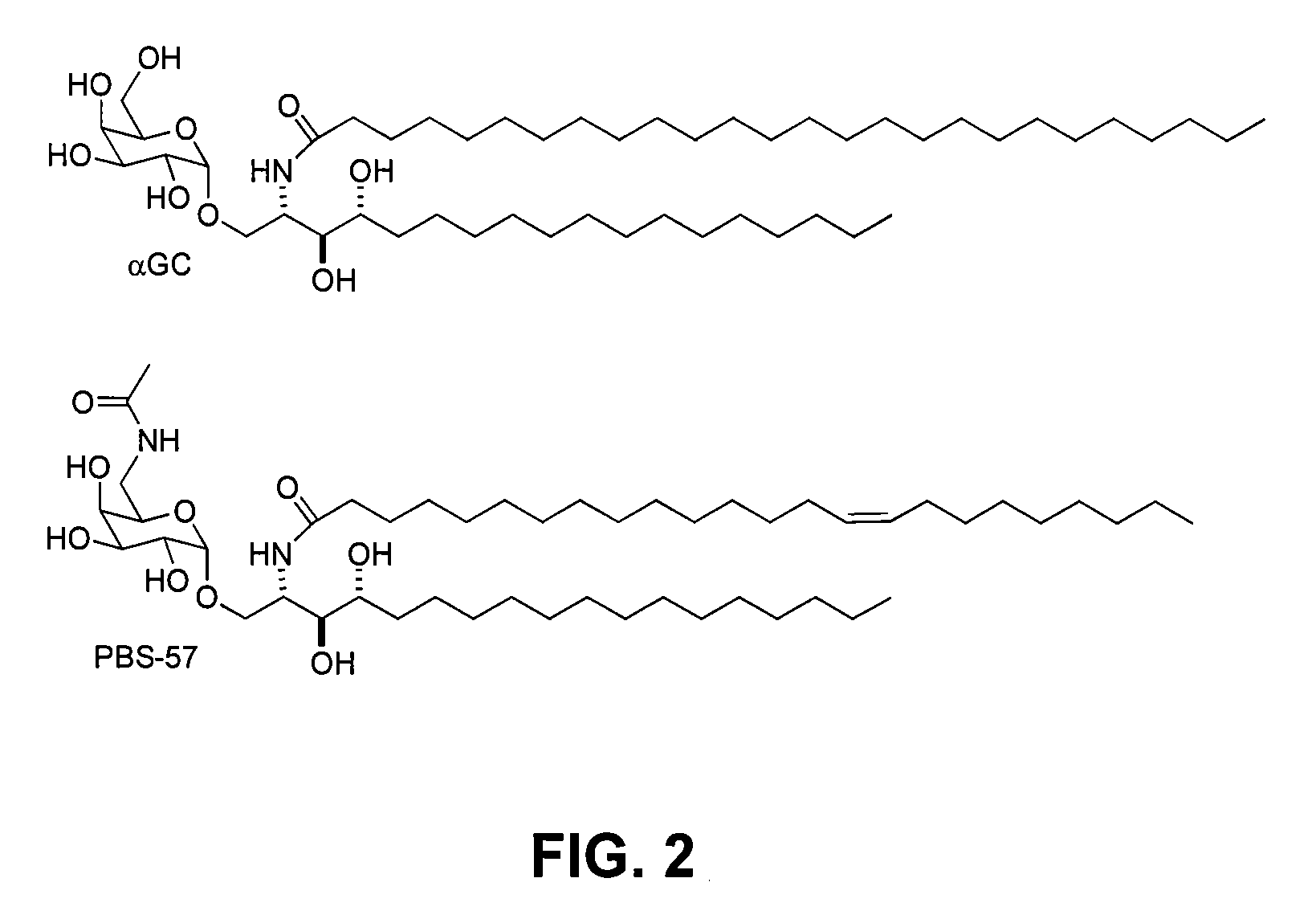Modified alpha-galactosyl ceramides for staining and stimulating natural killer t cells
a technology of alpha-galactosyl ceramide and tetramer, which is applied in the direction of antibody medical ingredients, peptide/protein ingredients, immunological disorders, etc., can solve the problems of relatively poor solubility of glycolipids in either aqueous or organic solvents, and achieve enhanced loading into cd1d tetramers, enhanced solubility, and enhanced nkt cell stimulation
- Summary
- Abstract
- Description
- Claims
- Application Information
AI Technical Summary
Benefits of technology
Problems solved by technology
Method used
Image
Examples
example 1
PBS-57 Synthesis and Solubility
[0081]PBS-57 was synthesized as shown in FIG. 1. Reagents corresponding to FIG. 1A are as follows (yields in parentheses): (a) PPh3, DPPA, DIAD (79%). (b) AcCl, MeOH (81%). (c) BnBr, NaH, DMF (47%). (d) AcOH, HCl (69% yield). (e) DAST, CH2Cl2 (87%). Reagents corresponding to FIG. 1B are as follows (yields in parentheses): (a) Nervonic acid, DCC, NHS, THF; Ac2O, Et2N, DMAP, (48%). (b) MeONa, MeOH, (71%). (c) Dimethylthexylsilyl chloride, pyridine; Ac2O, DMAP, (80%). (d) THF, HF, (83%). Reagents corresponding to FIG. 1C are as follows (yields in parentheses): (a) AgClO4, SnCl2, CH2Cl2, (56%). b) PPh3 / H2O, THF. c) Ac2O, Pyridine, DMAP, (80% overall) (d) Na°, NH3, −78° C. (47%).
[0082]The preparation of the intermediates in the synthetic route shown in FIG. 1 are described below.
[0083]Preparation of 2: Compound 1 (3.00 g, 11.3 mmol) was dissolved in dry THF (20 mL), cooled to 0° C., and PPh3 (5.95 g, 22.6 mmol) was added to the solution, followed by DIAD (5...
example 2
Staining of Vα14i NKT Cells with PBS-57 Loaded CD1d Tetramers
[0093]An typical means to isolate and quantify CD1 responsive NKT cells is through flow cytometry using fluorophore tagged CD1d tetramers loaded with sphingoglycolipids. To test for the ability of PBS-57 to facilitate CD1d tetramer staining, glycolipid-loaded CD1d tetramers were formed. Biotinylated mouse sCD1d molecules (in PBS) were mixed with PBS-57 or KRN7000 at a molar ratio of 1:3 (protein:lipid) and incubated overnight at room temperature. The following day, 80 μg of streptavidin-PE (Pharmagen) was added to 200 μg of the CD1-glycolipid mix and incubated at room temperature for 4 hours. Tetramers were stored at 4° C. until use.
[0094]Single cell suspensions of thymocytes and splenocytes were isolated from C57BL / 6J mice (Jackson Laboratories, Bar Harbor, Me.) as known in the art. The TCR repertoire of the NKT cells was limited with an invariable Vα subunit (Vα14 in mice) and varied Vβ subunits. 106 cells were incubated...
example 3
PBS-57 is Able to Facilitate Staining of Nkt Cells that Express a Wide Variety of Vβ TCR Subunits
[0095]The TCR expressed on NKT cells are limited to a invariant Vα, subunit, and a variable Vβ subunit that respond to glycolipid presentation by CD1d. To determine if PBS-57 loaded tetramers were Vβ subunit specific in their ability to bind, NKT cell hybridomas expressing different Vβ were tested for their ability to bind PBS-57 loaded CD1d tetramers. NKT hybridomas were established in the Bendelac and Hayakawa laboratories as described previously (Zhou et al., Lysosomal glycoshingolipid recognition by NKT cells, Science, 2004, 306:p. 1786-1788, and Gui et al., TCR beta chain influences but does not solely control autoreactivity of V alpha 14J281T cells, Journal of Immunology, 2001, 167:p. 6239-6246).
[0096]For staining of NKT cell hybridomas, soluble CD1d (sCD1d) tetramers were loaded with PBS-57 or KRN7000 by the following procedure. Stock reagents of the following were prepared: sCD1d...
PUM
| Property | Measurement | Unit |
|---|---|---|
| solubility | aaaaa | aaaaa |
| body weight | aaaaa | aaaaa |
| solubility | aaaaa | aaaaa |
Abstract
Description
Claims
Application Information
 Login to View More
Login to View More - R&D
- Intellectual Property
- Life Sciences
- Materials
- Tech Scout
- Unparalleled Data Quality
- Higher Quality Content
- 60% Fewer Hallucinations
Browse by: Latest US Patents, China's latest patents, Technical Efficacy Thesaurus, Application Domain, Technology Topic, Popular Technical Reports.
© 2025 PatSnap. All rights reserved.Legal|Privacy policy|Modern Slavery Act Transparency Statement|Sitemap|About US| Contact US: help@patsnap.com



